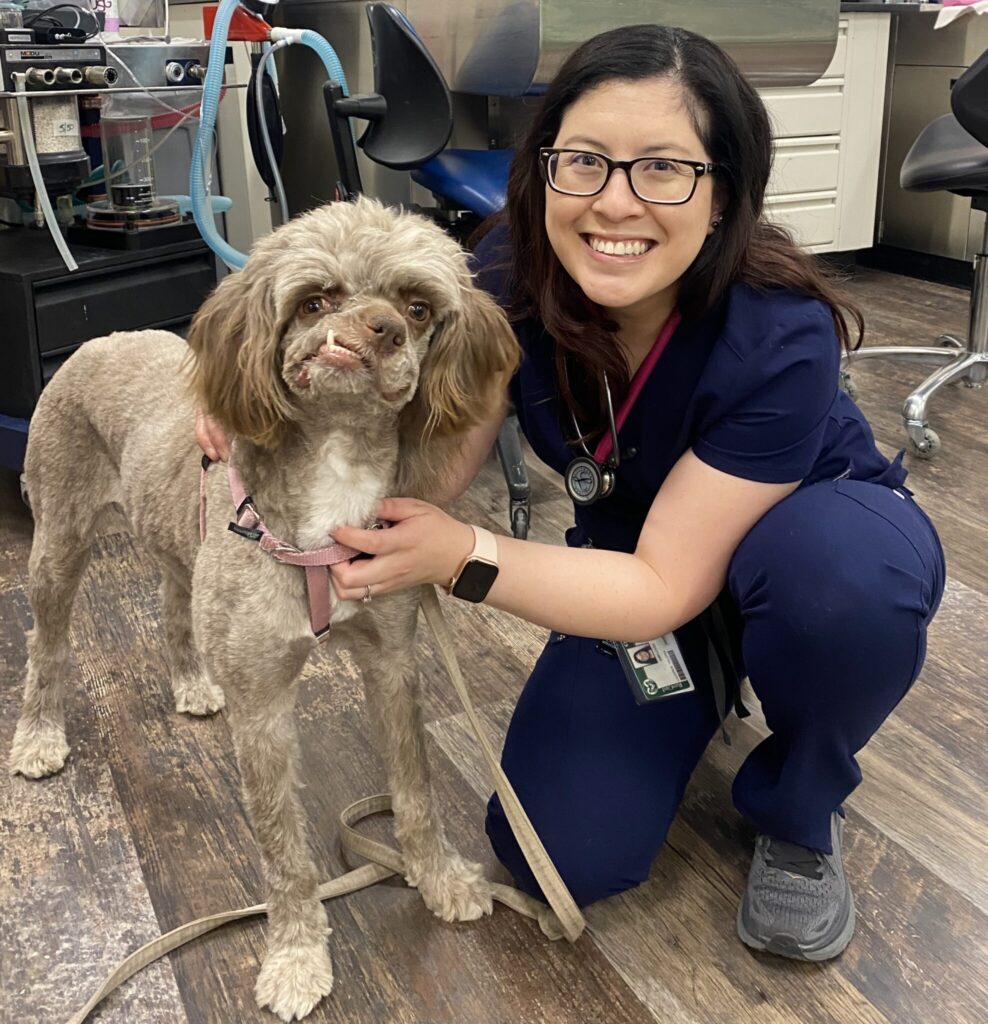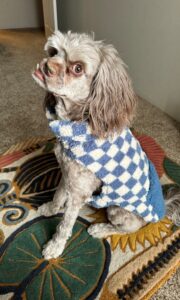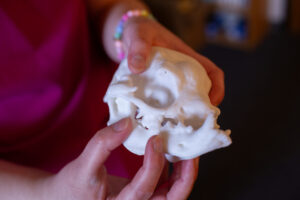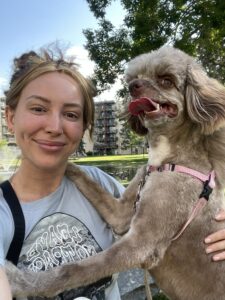The moment this canine patient saw her care team, she got the zoomies and started play-nibbling on their fingers just like a puppy. Only she’s not quite a puppy – she’s over a year old and couldn’t do any of this before her jaw surgery. Her name is Delilah, but her Instagram fans know her as the Picasso Puppy because of her uncanny resemblance to a Cubism painting.

Dr. Valeria Caceres, a third-year resident at Colorado State University’s James L. Voss Veterinary Teaching Hospital, performed the procedure, and recalls this interaction at Delilah’s checkup post-surgery. “Although I’ll never be able to ask her how she really felt, it was like she was trying to tell us how grateful she was we had changed her life,” Caceres said.
For Caceres, this was a special moment. When she was beginning her veterinary education, a case like Delilah’s led her to specialize in small animal dentistry and oral surgery.
A difficult beginning and a forever home

Delilah, a Poodle/Australian Shepherd mix, was found at 3-4 months old abandoned in rural New Mexico and in such poor condition that she was initially thought to be a middle-aged or a senior dog. She had a suspected trauma-induced fusion of her TMJ (temporomandibular jaw) joints which prevented movement of her jaw over a quarter inch.
Farfel’s Farm and Rescue took her into foster care to save her from being euthanized in a shelter. A photo of Delilah’s sideways grin and friendly snaggle tooth convinced Angelina Audiffred of Denver that it was time for her to adopt. Her first dog had just died early that year at the age of 15.
On November 19, 2022, about four months after being rescued, Delilah found her forever home, but Audiffred soon realized she had a lot more to overcome. Because of Delilah’s facial malformations, she couldn’t do many typical dog things.
She found a way to eat by directing food with her paws into the widest space between her teeth. A ball would not fit in her mouth, and a short walk could end in being dangerously overheated. Delilah started needing frequent emergency care.
A series of respiratory infections prompted Audiffred to seek out specialists. Even though she felt certain Delilah was right for her, she started to question: “Am I good enough for her? Am I able to provide for what she needs to live a quality life?
A second opinion brings specialty expertise
After seeing multiple providers, the only option given was placing a permanent tracheotomy in Delilah’s airway to aid breathing. One specialist suggested she seek a second opinion with the Dentistry and Oral Surgery service at Colorado State University, which is ranked 2nd in the nation for veterinary education.

Dr. Naomi Hoyer, assistant professor of dentistry and oral surgery, says CSU is uniquely capable of taking cases of facial trauma like Delilah’s. Because CSU is a teaching hospital, her team can work with other specialized departments, like Diagnostic Imaging (Radiology) just down the hall.
Radiology performed a CT scan, which they used to create a 3D model of Delilah’s skull. “Every one of those cases is very different, so we make the decision about what treatment to perform after we get our 3D models and can evaluate what procedure would be best,” Hoyer said.
Hoyer worked alongside Caceres in creating Delilah’s treatment plan. They showed Audiffred the model and talked about her goals for Delilah. They recommended removing a small portion of her lower jaw to gain movement.
This procedure is called a segmental mandibulectomy. It requires specialized tools and exact positioning because of the proximity of the mandibular artery. There was also a potential the bone would grow back, and the surgery wouldn’t be effective.
However, if it worked, the team believed it would address Delilah’s needs for breathing, respiratory health, nutrition, and quality of life. The community and multiple non-profits came together to fund the procedure and Delilah had her surgery on May 31, 2023.
The surgery was effective, and it allowed Delilah to open and close her jaw. “I have never had such an amazing experience,” Audiffred said of the care she received with the VTH from the front desk to the Dental and Oral Surgery team. “Without you guys, I wouldn’t have my dog right now.”

Still the Picasso Puppy, but thriving
Besides getting some teeth pulled at a re-check, Delilah hasn’t needed additional procedures. Audiffred says Delilah is thriving.
She can eat normally and walk – even run – now without overheating. While initially concerned about how delicate Delilah’s jaw may be post-surgery, Audiffred says the procedure has given her so much more life.
“She still plays tug of war and wins,” Audiffred laughed. “You have four teeth. How are you doing this?” And while her smile is a little bigger, Delilah didn’t lose any of her signature good looks from the procedure. She still has the sideways grin and snaggle tooth that Audiffred fell in love with.
Hoyer, who oversees instruction and education for procedures like Delilah’s said: “We are grateful to be in the dentistry and oral surgery specialty every day, but there is something so special and unique about helping patients like Delilah. To be able to take a dog, who since she was a puppy, had not been able to live like a dog, and get her a new lease on life is such a blessing.”